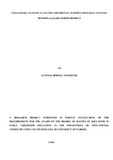| dc.description.abstract | This study looked into the challenges faced by class one children of public schools in learning Kiswahili it Ngong Division, Kajiado North District. Several researches in learning languages have been carried out ir developed countries. Language is basic to all communication between one person and another world over. II Ngong Division Kiswahili is a second language thus there was a need for a research of this kind. Thr purpose of this study was to investigate the challenges faced by class one children in learning Kiswahil language in Ngong Division, Kajiado North District. Study objectives were to identify challenges, determin, causes of the challenges and suggest solutions to the challenges faced. It was limited to selected primary schools in Ngong Division due to financial constraints and delimited to class one pupils in public schools class one teachers and head teachers.
The assumption was that there were challenges class one childrer faced in learning Kiswahili. Relevant literature on language learning was reviewed with Krashen's affectivt filter theory being the theoretical framework. The design of the study was descriptive survey. Targe population for the study was public primary schools in Ngong Division. A random sample of 17 primarj schools was used. Class one children, their teachers and head teachers were used.
Instruments used were l questionnaire, an interview guide and an observation schedule. Also used was the class one timetable anc pupils daily diary. Piloting was done in eight primary schools not involved in the main research because they shared similar characteristics. Data were collected using the above instruments by the researcher anc trained research assistants. Data analysis was perfonned using SPSS software for statistical analyses.
The study found that many class one children did not learn KiswahiIi in preschools. The instructional resources were inadequate, there was lack of competence in teaching Kiswahili amongst some teachers. Influence 01 mother tongue and' Sheng' as well as media, had affected on class one Kiswahili learners. The stud) observed that class one learners imitated and modelled substantially from their teachers and the immediate environment. The study recommended research on categories such as urban primary schools and rural primary schools. | en_US |

